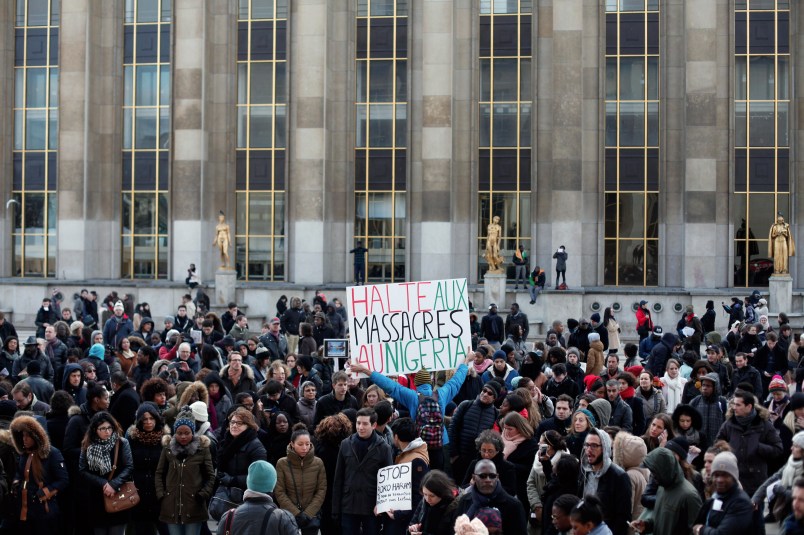When Islamic extremists attacked the Charlie Hebdo magazine and a Kosher supermarket in east Paris, killing 17 people, the global response was instantaneous. More than 40 heads of state joined in a solidarity march in Paris. Memorials with millions of participants took place across the globe from Sydney to New York. The phrase “Je Suis Charlie” (“I am Charlie”) trended on Twitter and Facebook. President Obama even took the unusual step of visiting the French Embassy to pay his respects.
Yet only days after the Paris shootings, more than 6,000 kilometers south of Paris, a terror attack in Baga, Nigeria left 2,000 dead. Unlike those murdered in France, these victims have not been memorialized. There have been no solidarity marches, “I am Baga” has not trended on Twitter or Facebook, and President Obama has not visited the Nigerian Embassy. In fact, most Americans have probably never heard of Baga, Nigeria, nor do they know much about Boko Haram, the militant group fighting to carve out a fundamentalist Islamic state in West Africa. This failure to place a greater emphasis on the tragic events in Nigeria is emblematic of America’s unfortunate tendency to ignore relationships with some of its most important—but less well-known—allies.
Nigeria has a population of over 170 million, which accounts for one-sixth of Africa’s total population. With a fertility rate of six births per woman (and a high volume of trade with the U.S.), Nigeria’s economic importance will only keep growing. Moreover, an estimated one million Nigerians and Nigerian-Americans live, study and work in the U.S.; they have the highest education level of any immigrant community. Nigeria is also a key regional ally of the United States from a security perspective, especially because its government has consistently supported military actions against the Taliban and Al Qaida. Nigeria has also led the effort to develop counterterrorism capabilities across states in Sub-Saharan Africa while fighting its own war against militants.
Although the Nigerian military used training and limited equipment provided by the U.S. to stand up a Nigerian Army Special Operations Command specializing in counter-terrorism and counter-insurgency last year, this falls short of the support we should be providing our ally. If the U.S. is going strengthen economic ties with Nigeria, protect regional stability, and prevent horrible attacks from killing thousands of innocents, we need to pay greater attention to both Nigeria’s internal security situation as well as its government’s struggles with transparency and accountability.
Nigeria is in a period of transition, bordering on turmoil. The nation is split almost evenly between a mostly Muslim north and largely Christian south. Although the majority of the victims of Boko Haram are Muslim, Christians have been targeted in Nigeria’s north. There have also been attacks on Muslims in the south, slowly polarizing the nation. A civil war in Nigeria along religious lines, no doubt a goal of Boko Haram, would be a regional humanitarian catastrophe.
The government’s recent announcement that elections will be postponed—under the pretext of security—underscores the complex geographic and religious dynamics at play in Nigeria. The current President, Goodluck Jonathan, is seeking a second term against his primary opponent, Muhammadu Buhari. Jonathan, from southern Nigeria, has been widely criticized for failing to stem the tide of Boko Haram; more than 10,000 people have been killed by Boko Haram since Jonathan’s election in 2010. Buhari, from northern Nigeria, is a retired Major General who ruled Nigeria in the 1980s after overthrowing the democratically elected president in a coup d’etat. Whoever is named president (and whenever the elections might come to pass) it is clear that the United States must think long and hard about its relationship with the elected leader moving forward.
The United States needs to start paying more attention. While Secretary of State John Kerry’s recent visit to Nigeria to reiterate support for the fight against Boko Haram was a positive step, his urging for credible, transparent and peaceful elections appears to have fallen on deaf ears. Moving forward, the U.S. must consistently engage with Nigerian leadership and demand the kind of good governance that will ultimately do the most to push back against violent extremism. Nigeria, like the 2,000 victims of the massacre by Boko Haram, deserves our attention.
Adam Tiffen is a member of the Truman National Security Project’s Defense Council and a veteran of three tours in Iraq and Afghanistan. He currently works in frontier and emerging markets. Views expressed are his own. Follow him on Twitter: @TiffenDC.







Easy one. Parisians are seen to be white.
Paris is a center of western civilization & culture. Nigeria is not…in fact it is nearly the opposite.
How much video in Nigeria and how much video in Paris? Charlie Hebdo is a media outlet. Nigeria feels like a civil war. France, not so much.
Because Nigerians are black. It’s another blacks vs whites.
Location, Location, Location.